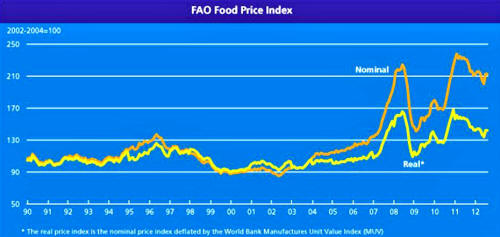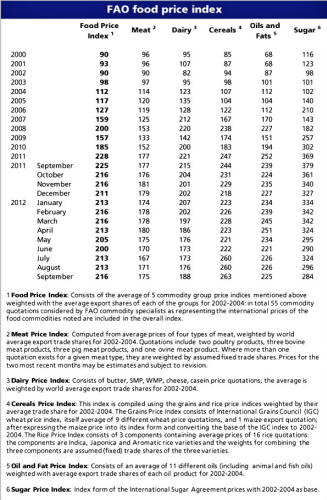|
According to a group of researchers, their mathematical model using food prices can predict social unrest and riots.
Given the drought and rampant speculation, this may bode ill for several regions in the world. Food prices have been rising for quite some time, and aren’t showing any sign of slowing.
People raise their voices and go to arms for reasons too complicated to address here altogether, but it would be folly to leave hunger out of the equation.
The spark may be an anti-Islam film or an incident of police brutality, but Yaneer Bar-Yam of the New England Complex Systems Institute (NECSI) in Cambridge, Massachusetts says that it’s high food prices that create,
History of Accurate Predictions
The NECSI has received attention of late for its accurate predictions of food price behavior, most notably those showing spikes in food prices that coincided with the 2007-2008 riots.
They even submitted findings to the U.S. government - four days before Mohamed Bouazizi, a Tunisian produce vendor, set himself on fire and, many say, catalyzed the Arab Spring.
The institute has also drawn fire for not being peer-reviewed.
One such critic, economist Dave Lobell, nevertheless concedes that at least the public sees the institute’s predictions well before the completion of a theoretical peer review process, and time will tell if the predictions are accurate.
Ready to Riot
The NECSI models show that the stage is set for rioting when the food price index surpasses 210.
Unfortunately, the index has been sneaking around that number since July, thanks especially to the summer drought. Wheat is $9 a bushel - a problem especially for the Middle East which imports most of that staple.
Also, thanks to ethanol production, corn is $7.56 a bushel.
Peter TImmer, a Harvard professor emeritus recently inducted into NECSI faculty, says that the model is,
Time will tell, though it seems history is on the institute’s side.
Additional Sources
|



